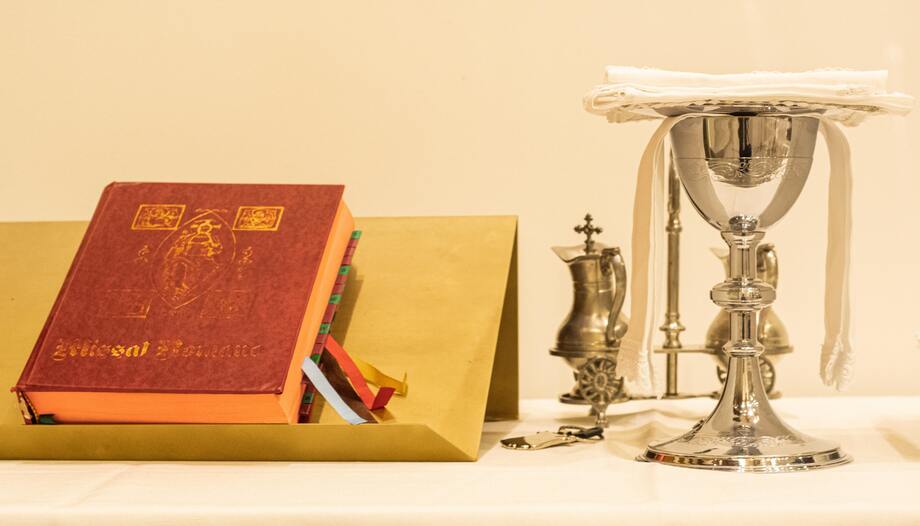 "The Dialogue of Love between the Father and the Son", Third Sunday of Lent.
"The Dialogue of Love between the Father and the Son", Third Sunday of Lent. "The light of faith makes us see God's mercy."
"The light of faith makes us see God's mercy."At the beginning of this third week we find ourselves with the longest Sunday Collect of Lent. The experts in charge of revising the prayers of the Missal replaced the one in use until 1962 with one from the old Gelasian sacramentary, with very minor changes. This is how we arrive at the current formulation:
O God, author of all mercy and goodness, who accepts fasting, prayer and almsgiving as a remedy for our sins, look with love on the recognition of our littleness and lift up with your mercy those of us who are cast down by our conscience. Deus, omnium misericordiárum et totíus bonitátis auctor, qui peccatórum remédia in ieiúniis oratiónibus et eleemósynis demonstrásti, hanc humilitátis nostrae confessiónem propítius intuére,ut, qui inclinámur consciéntia nostra, tua semper misericórdia sublevémur.
The pillars of Lent
A first reading is enough to reveal the cornerstone on which this text is built: the mercy of God. In fact, this divine attribute appears both in the extensive initial invocation and in the second petition, thus receiving special emphasis. We invoke the Father of mercies (cf. 2Co 1:3), as so many pious Jews have invoked him (cf. Ps 41 [40]; 51 [50]), in a way that is in itself a petition. Jesus taught the same thing in the parable of the Pharisee and the tax collector (cf. Lk 18:9-14). And this is what so many implored him, like the blind man on the outskirts of Jericho (cf. Lk 18:38). Whether what we need is healing of the soul or of the body, the path always passes through divine mercy.
It was not for nothing that the Holy Father wanted to proclaim a Jubilee of Mercy a few years ago. On that occasion, he wrote in the Bull of Convocation: "We always need to contemplate the mystery of mercy. It is a source of joy, serenity and peace. It is a condition for our salvation. Mercy: is the word that reveals the mystery of the Most Holy Trinity. Mercy: it is the ultimate and supreme act by which God comes to meet us (...) Mercy: it is the way that unites God and man, because it opens the way to God's salvation. heartbeat to the hope of being loved forever in spite of the limit of our sin".
At the same time, divine goodness has to meet human goodness, and those who ask for what they cannot, must do all they can. That is why the Collect mentions prayer, fasting and almsgiving as the ascetic pillars of Lent. By using them we will find a good remedy for our sins. Jesus refers to them in his preaching, as we remember on Ash Wednesday (cf. Mt 6:1-18). In the same vein, St. Augustine helps us to understand their value: "Do you want your prayer to fly to God? Give it two wings: fasting and almsgiving".
On the firm ground of divine mercy
Through the aforementioned Lenten practices, lived in a spirit of penitence and trust in the Lord, we confess our humility and littleness before God (humilitatis nostrae confessionem), and we ask him to look upon us with indulgence, understanding and forgiveness (propitius intuere), not of rejection or condemnation, because we are certain that God wants all men to be saved (cf. 1 Tim 2:4) and for this purpose he sent his Son into the world (cf. Jn 3:17).
It is the same gaze that we invoke the Father to have when we present to Him in the Eucharistic prayer our gifts and our life united to the offering made by Christ on the Cross: "Look with eyes of goodness on this offering and accept it" (Roman Canon). Having limitations, miseries and sins is not a reason to turn away from God, nor to think that He turns away from us. On the contrary, it is a reason for us to seek Him more earnestly and a call for Him to draw near to us, because, just as the healthy do not need a physician but the sick, so the Lord came to call not the righteous but sinners to penance (cf. Mk 2:17).
Therefore, God's gaze will always be a merciful gaze, which lifts us up (mercy sublevemur), even when the sins that weigh on our conscience would like to keep us oppressed, inclined (inclinamur conscientia nostra). It is the reaction of the merciful father who, when the prodigal son begins to confess to him "I have sinned against heaven and against you, I am no longer worthy to be called your son", rushes to cover him with kisses and asks for the best robe, the ring, the sandals and organizes a banquet (cf. Lk 15:11-32).
Nothing better, moreover, than to end this Lenten prayer with a veiled allusion to Easter, because the grace of Christ lifts us up, raises us from the lowest to the highest, that is, gives us a new life, that of the Risen One. Filled with this new life, we can walk erect and upright, as befits those who are risen in Christ, firmly resting on the firm ground of divine mercy.
Priest from Peru. Liturgist.











